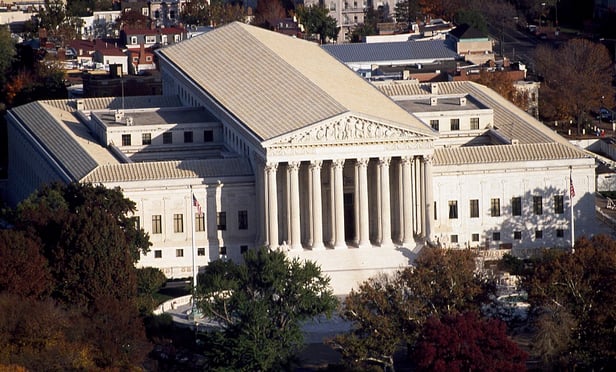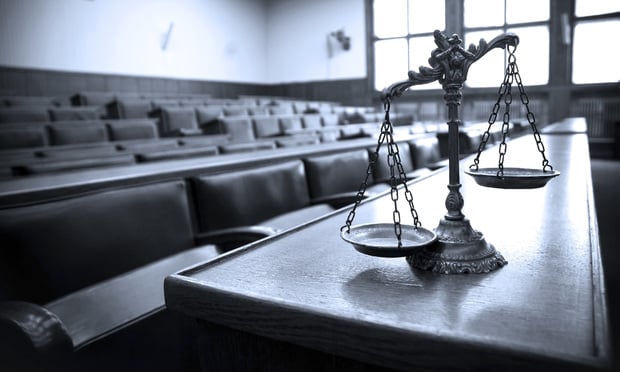Stephen A. Miller

June 09, 2015 | The Legal Intelligencer
In Same-Sex Marriage Case, Justices Face Complex Social, Legal IssuesLater this month, the U.S. Supreme Court will rule on the constitutionality of state laws prohibiting same-sex marriage. The consolidated action, captioned as , Docket No. 14-556, has sparked widespread media attention, protests, and the filing of 126 amicus curiae briefs. The court will address two questions: (1) whether state laws prohibiting same-sex marriage violate the equal protection or due process clauses of the 14th Amendment; and (2) whether states have the power to refuse to recognize same-sex marriages lawfully performed in other states.
By Stephen A. Miller and Arthur P. Fritzinger
6 minute read

May 14, 2015 | The Legal Intelligencer
Supreme Court Weighs Hotel Owners' Right to 'Tranquility'Justice Antonin Scalia succinctly summarized the plaintiffs' position during a recent oral argument before the U.S. Supreme Court in City of Los Angeles v. Patel, No. 13-1175: "You can't see my register. It's dear to me."
By Stephen A. Miller and Diana Lin
6 minute read

May 13, 2015 | The Legal Intelligencer
Supreme Court Weighs Hotel Owners' Right to 'Tranquility'Justice Antonin Scalia succinctly summarized the plaintiffs' position during a recent oral argument before the U.S. Supreme Court in , No. 13-1175: "You can't see my register. It's dear to me."
By Stephen A. Miller and Diana Lin
6 minute read

April 09, 2015 | The Legal Intelligencer
US Supreme Court Considers Religious AccommodationsIn February, the U.S. Supreme Court heard oral argument in an important case regarding employers' obligations to accommodate employees' religious practices under Title VII of the Civil Rights Act of 1964. Must the employer have actual knowledge that the applicant or employee requires a religious accommodation, or does a hunch suffice? And must that knowledge come from direct, explicit notice from the applicant or employee, or can it come from some other source? The justices will try to answer these questions in Equal Employment Opportunity Commission v. Abercrombie & Fitch Stores, No. 14-86.
By Stephen A. Miller and Kaitlin M. DiNapoli
7 minute read

April 08, 2015 | The Legal Intelligencer
US Supreme Court Considers Religious AccommodationsIn February, the U.S. Supreme Court heard oral argument in an important case regarding employers' obligations to accommodate employees' religious practices under Title VII of the Civil Rights Act of 1964. Must the employer have actual knowledge that the applicant or employee requires a religious accommodation, or does a hunch suffice? And must that knowledge come from direct, explicit notice from the applicant or employee, or can it come from some other source? The justices will try to answer these questions in , No. 14-86.
By Stephen A. Miller and Kaitlin M. DiNapoli
7 minute read

March 12, 2015 | The Legal Intelligencer
US Supreme Court Confronts Testimony in Child Abuse CasesChild abuse cases are notoriously difficult to prosecute, in large part because there are often few witnesses to the alleged abuse, and those witnesses are often very young. The question whether those young witnesses must testify about their abuse in court, therefore, has great practical and constitutional importance. The U.S. Supreme Court already held in 1990 that child abuse victims, under certain circumstances, can testify via closed-circuit television (and therefore not directly face their alleged abusers). The question before the court this term in Ohio v. Clark, No. 13-1352, is whether those victims need to testify at all.
By Stephen A. Miller and Kathryn A. Young
6 minute read

March 11, 2015 | The Legal Intelligencer
US Supreme Court Confronts Testimony in Child Abuse CasesChild abuse cases are notoriously difficult to prosecute, in large part because there are often few witnesses to the alleged abuse, and those witnesses are often very young. The question whether those young witnesses must testify about their abuse in court, therefore, has great practical and constitutional importance. The U.S. Supreme Court already held in 1990 that child abuse victims, under certain circumstances, can testify via closed-circuit television (and therefore not directly face their alleged abusers). The question before the court this term in , No. 13-1352, is whether those victims need to testify at all.
By Stephen A. Miller and Kathryn A. Young
6 minute read

February 12, 2015 | The Legal Intelligencer
Justices Eye Hierarchy of Protected Speech in Street Sign CaseThe U.S. Supreme Court has an opportunity to overhaul its First Amendment jurisprudence in a case involving street signs in Arizona. For many years, the court has applied the First Amendment's protection—"Congress shall make no law … abridging the freedom of speech"—with different levels of rigor depending on the type of speech involved.
By Stephen A. Miller and Leigh Ann Benson
6 minute read

February 12, 2015 | The Legal Intelligencer
Justices Eye Hierarchy of Protected Speech in Street Sign CaseThe U.S. Supreme Court has an opportunity to overhaul its First Amendment jurisprudence in a case involving street signs in Arizona. For many years, the court has applied the First Amendment's protection—"Congress shall make no law … abridging the freedom of speech"—with different levels of rigor depending on the type of speech involved.
By Stephen A. Miller and Leigh Ann Benson
6 minute read

January 15, 2015 | The Legal Intelligencer
U.S. Supreme Court Analyzes Pregnancy DiscriminationIn Young v. United Parcel Services, No. 12-1226, the U.S. Supreme Court will decide the appropriate standard to apply in determining whether an employer has violated the Pregnancy Discrimination Act. More specifically, the court will determine under what circumstances pregnant employees are entitled to work accommodations that are provided to their non-pregnant coworkers.
By Stephen A. Miller and Jessica A. Hurst
8 minute read
Trending Stories
- 1Western NY Justice Agrees to Public Admonishment Over 'Obvious' Conflict of Interest
- 2How to Litigate Before the EU’s Top Court, the European Court of Justice
- 3After Solving Problems for Presidents, Ron Klain Now Applying Legal Prowess to Helping Airbnb Overturn NYC Ban
- 4Attorneys Allege Contract Broken for Sharing $13M in Fees From MDL
- 5ZwillGen Acquires Lawyers, Scientists and Technology from Luminos.Law, Developer of Luminos.AI Platform
More from ALM
- Scan In Progress: Litigators Leverage AI to Screen Prospective Jurors 1 minute read
- Legal Speak at General Counsel Conference East 2024: Match Group's Katie Dugan & Herrick's Carol Goodman 1 minute read
- Legal Speak at General Counsel Conference East 2024: Eric Wall, Executive VP, Syllo 1 minute read



